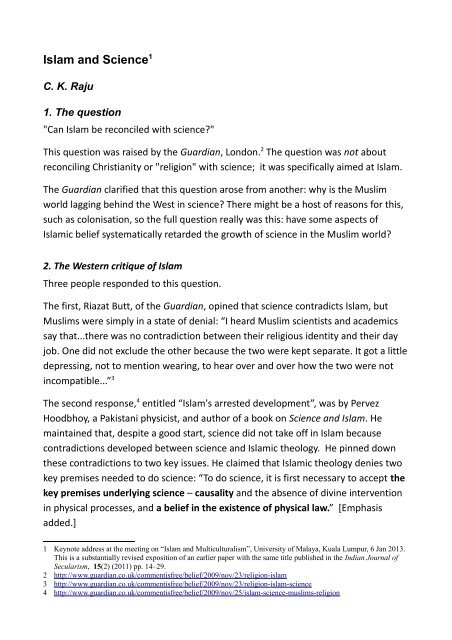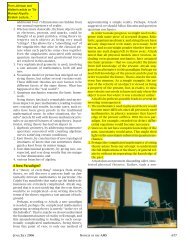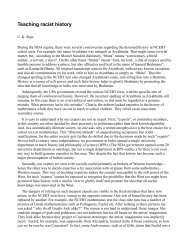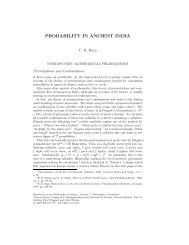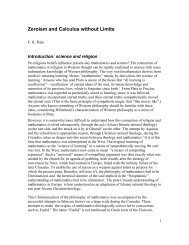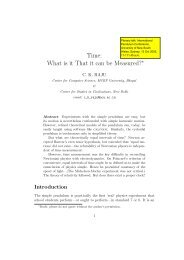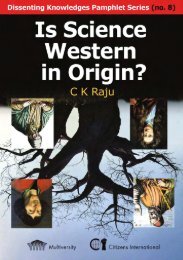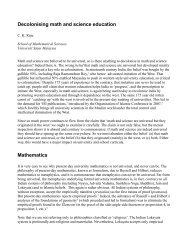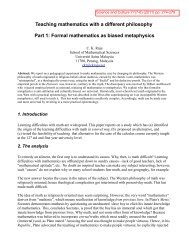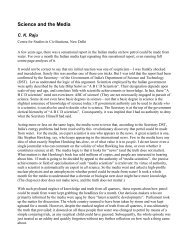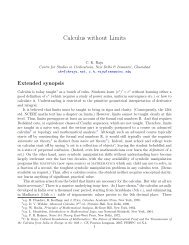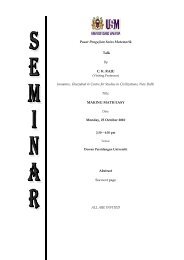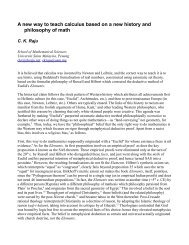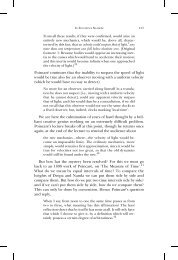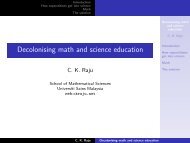Islam-and-Science-kl.. - CK Raju
Islam-and-Science-kl.. - CK Raju
Islam-and-Science-kl.. - CK Raju
Create successful ePaper yourself
Turn your PDF publications into a flip-book with our unique Google optimized e-Paper software.
That is, Hoodbhoy maintained that belief in “causality” <strong>and</strong> “laws of nature” isessential to do science. This is denied by <strong>Islam</strong>. Hence Muslims have fallen behind inscience.The third response was by Britain-based Usama Hussain, 5 a Cambridge trainedastronomer, <strong>and</strong> also an Imam. He concurred that denial of causality was a key factorresponsible for the decline of science in <strong>Islam</strong> <strong>and</strong> squarely pinned the blame forthat on al Ghazali, a key <strong>Islam</strong>ic theologian of the 12 th c., who represents thecurrent orthodox (Sunni) view.These arguments are not merely the opinions of the Guardian or its respondents.The Guardian was systematically publicising a long-held Western critique of <strong>Islam</strong>. 6 Itis important to address that critique, which has never before been correctlyaddressed by Muslim scholars.This Western critique of <strong>Islam</strong> spreads not only through newspapers but alsothrough the education system. As a Senate member of the Univerisiti Sains MalaysiaI objected to a course on the philosophy of science which heavily emphasized exactlythese two issues of “causality” <strong>and</strong> “laws of nature”. 7 Why? The devout Christianteacher, who framed the syllabus, could not explain, since he knew no science,having primarily trained in divinities. But Cambridge had given him a PhD in history<strong>and</strong> philosophy of science (presumably because of its strong overlap with divinities).Anyway, the fact remains that our budding philosophers of science are brought upon this Western critique of <strong>Islam</strong>.3. Causality <strong>and</strong> al GhazaliLet us set aside this Western critique, for a moment, <strong>and</strong> first try to underst<strong>and</strong> alGhazali's real position. The <strong>Islam</strong>ic philosophers, like Ibn Sina (Avicenna), weretypically also medical doctors. (Indeed, the word hakim means both a wise man <strong>and</strong>a medical doctor.) They thought that to treat an ailment one must underst<strong>and</strong> itscause. Hence, they subscribed to the belief in causality.The meaning of causalityThe word “causality” means many things, <strong>and</strong> is hence a rich source of confusion,5 http://www.guardian.co.uk/commentisfree/belief/2009/nov/27/islam-science-ghazali6 On the Western scholarly representation of al Ghazali as occasionalistic, see, e.g., Richard Sorabji, Time, Creation<strong>and</strong> the Continuum, Duckworth, London, 1983.7 For the minutes of the meeting, see http://ckraju.net/usm/PSc-minutes.html. Note how no one was able to provide aconcrete example of an (eternal) “law” of nature.
Continuous creation <strong>and</strong> immanenceNote, further, that al Ghazali believed in immanence (God in man) as in the sufitradition. This is quite distinct from the transcendent underst<strong>and</strong>ing of God in theWest (after post-Nicene Christian theology 13 ). Al Ghazali's underst<strong>and</strong>ing was thatAllah was the real agent, <strong>and</strong> the human being only manifested the will of Allah. Thisis much like saying that the true cause of writing is not the pen or the h<strong>and</strong> but thewill of the writer (who hence gets the credit for the writing, not the pen). Thus, in alGhazali's underst<strong>and</strong>ing, human creativity was only a manifestation of the creativityof Allah so that denial of human creativity (as observed through continuouscreation) also amounted to a denial of the creativity of Allah.Habits <strong>and</strong> inductionIn this process of continuous creation, al Ghazali said Allah was free to choose whathe wanted to create. Allah creates smoke with fire as a matter of habit. He is notcompelled to do so. To be sure we have long observed that smoke occurs with fire.But from a long series of past observations that smoke occurs with fire, we can onlyinfer that it is likely that fire will be accompanied by smoke; induction is not certain.(And certainty, or invariable concomitance, is needed to establish the relation ofcause <strong>and</strong> effect.) Those trained in Western philosophy will recognize this as theunanswerability of Hume's objections. (Even Aquinas had read al Ghazali, so Hume'sarguments are copied from al Ghazali, but to hide his own lack of creativity, <strong>and</strong>promote his racist thesis he did not acknowledge his source.)Since causes can only be established by observation, <strong>and</strong> induction, one can neverestablish a cause with certainty. There is no way around this argument, despitePopper's claims to have resolved the problem of induction. 14 Al Ghazali's opponent,Ibn Rushd (Averröes), highly rated by Westerners, ranted <strong>and</strong> raved against him, butcould not give any substantive argument; hence the Guardian respondents could dono better than quote some polemics from him.13 Pre-Nicene Christian theology believed in immanence. Origen said “God will be...all <strong>and</strong> in all”. (Origen, DePrincipiis, 3.7, http://www.newadvent.org/fathers/04122.htm. Transcendence, however, conferred greaterimportance on the priest, hence the church chose it.14 In his Postscript to Logic of Scientific Discovery, Popper incorrectly claimed to have solved the problem ofinduction by using Kolmogorov probability. He was right that (axiomatic) probabilities are not ampliative, butoverlooked that observation only gives us estimates of probabilities, never the probabilities themselves. See, C. K.<strong>Raju</strong>, “Probability in Ancient India”, H<strong>and</strong>book of the Philosophy of <strong>Science</strong>, vol 7: Philosophy of Statistics,Elsevier, Amsterdam, 2010, pp. 1171-91.
Al Ghazali <strong>and</strong> logicAl Ghazali's arguments are not illogical 15 (he wrote a book on logic, <strong>and</strong> allowed thateven Allah was bound by logic). To the contrary, as I have explained elsewhere, 16 alGhazali inaugurated a novel point about logic imitated (without acknowledgment) bylater-day formal logicians like Tarski <strong>and</strong> Wittgenstein, namely that empirical truth iscontingent truth (true in some possible worlds), unlike deductive truth which isnecessary truth (true in all possible worlds).The only difference is that where al Ghazali spoke of possible worlds that Allah cancreate, in Tarski-Wittgenstein formal semantics one speaks of possible logical worldsin the sense of Wittgenstein! It is on this belief that logic binds God (who hencecannot create an illogical world) that the West concluded that deductive truths arestronger than empirical truths (for empirical truths relate to this world, <strong>and</strong> Godmight have created another sort of world) . Hence, inductive truths being empirical,they can never provide the (believed) certainty of deductive truth.SummaryTo summarise, (a) al Ghazali believed in habits not laws. The difference is that habitscan be broken, laws cannot be. (b) He believed in the creativity (of Allah), not causalnecessity. This is a simple matter of everyday observation, for al Ghazali attributedobserved human creativity (or our ability to create a bit of the future) to the divineelement within man. (c) Al Ghazali's beliefs are logical (<strong>and</strong> are used in present-dayformal logic).To better underst<strong>and</strong> this point of view, let us look at its anti-thesis in churchtheology after the Crusades.3. Crusades <strong>and</strong> the “laws” of natureBy way of background, the real objective of the Crusades was to try <strong>and</strong> bringMuslims under church control by force, the way (the rest of) Europe wasChristianised by force (through military conquests by Christian emperors such asCharlemagne). But the Crusades failed militarily beyond Spain. In fact, all Crusades15 In fact, as a logician, al Ghazali drew a distinction between logical necessity <strong>and</strong> causal necessity, similar to thedistinction used today to discriminate between the logical refutability of a scientific theory, <strong>and</strong> its empiricalrefutability. So, what al Ghazali said was that it is not logically necessary for cotton in contact with fire to burn; eventhough we have always observed this to happen, we can conceive that it may not happen. For a more detailedexposition of al Ghazali's arguments, in this vein, using Western terminology, see C. K. <strong>Raju</strong>, The Eleven Picturesof Time, Sage, 2003, pp. 222 et seq.16 C. K. <strong>Raju</strong>, “The religious roots of mathematics” , Theory, Culture, <strong>and</strong> Society, 23(1–2) Jan-March 2006, Spl. Issueed. Mike Featherstone, Couze Venn, Ryan Bishop, <strong>and</strong> John Phillips, pp. 95–97.
That is, denying that mundane experience refutes the belief in eternal “laws ofnature” makes the belief in “laws of nature” irrefutable, hence unscientific.If the belief in “laws of nature” is either refuted or irrefutable that makes it anunscientific belief. This conclusion st<strong>and</strong>s Hoodbhoy et al exactly on their head. Thisis a position from which they seem completely incapable of responding, for theyhave not responded so far.The fallibility of scienceThe typical theological reaction is to disprove by caricature, as in the caricature alGhazali as occasionalistic (a possible objection al Ghazali himself took intoaccount 24 ). To avoid such theological sophistry, let us also note that to deny thebelief in “laws” as unscientific is not to deny all regularity.The belief in scientific models, habits etc. is fine, <strong>and</strong> is the essence of science, solong as we recognize that scientific models are forever fallible, <strong>and</strong> may change, likehabits. Fallible scientific models, howsoever successful, cannot establish theexistence of eternal “laws”. That is, al Ghazali's point of view (“habits” that canchange) was more scientific than the Western theological viewpoint (eternal <strong>and</strong>unchanging “laws”).Interim summaryTo recapitulate, the belief in “laws of nature” was a part of Christian dogma sincethe Crusades. This belief antedated modern science <strong>and</strong> infiltrated it. It neverthelessremains an unscientific belief or a superstition, since (a) it is immediately refuted bycommon experience, <strong>and</strong> (b) attempts to save the belief from such refutation makeit irrefutable hence unscientific. Thus, the authority of science is today being usedto attack <strong>Islam</strong> with the help of these Christian superstitions passed off as keypremises of science.Creationism, laws of physics, <strong>and</strong> Stephen HawkingThere is nothing “medieval” about propagating Christian superstitions throughscience. The process certainly did not end with Newton's “laws”. To take acontemporary example, Stephen Hawking's singularity theory is nothing butcreationism. Thus, Hawking claimed to have proved the existence of a cosmological24 Al Ghazali actually attributed the occasionalistic viewpoint to his opponent, <strong>and</strong> it is sad that Western scholars donot acknowledge this honestly.
“singularity”, which he interpreted as a beginning of time or the moment ofcreation. (Contrary to the naïve belief, the big bang theory itself does not establishcreation, for it is conceivable that the cosmos periodically goes through a densestate, as may happen with a rotating cosmos, in Newtonian cosmology. That is thepossibility that Hawking's singularity theory claims to have eliminated.)This creationist underst<strong>and</strong>ing of “singularity” is quite explicit in Hawking's(scholarly) book The Large Scale Structure of Space Time the bottom line (orconcluding sentence) of which is this:...the actual point of creation, the singularity, is outside the scope of thepresently known laws of physics. 25At a more popular level, Hawking explained that this breakdown of the laws ofphysics, at the “actual” moment of creation, permitted creativity to God. This isasserted in his popular book as follows.At the big bang <strong>and</strong> other singularities, all the laws [of nature] would havebroken down, so God would still have had complete freedom to choosewhat happened <strong>and</strong> how the universe began. 26Note the indirect admission that the “laws of physics” do constrain God's freedom tocreate the cosmos. Note, also, how Hawking's conclusion elevates the belief in onetimecreation over the belief in continuous creation: for the belief is that the “laws ofnature” have been in force ever since the time of creation.The point of view has been taken to greater heights by Tipler, a professor of physics,who claimed that Hawking's physics has proved the truth of all Christianity <strong>and</strong> thattheology is a branch of physics, that physicists can infer by calculation theexistence of God <strong>and</strong> the likelihood of the resurrection of the dead toeternal life in exactly the same way as physicists calculate the properties ofthe electron.…the central claims of Judeo-Christian theology are in facttrue,… these claims are straightforward deductions of the laws of physicsas we now underst<strong>and</strong> them. I have been forced into these conclusions bythe inexorable logic of my own special branch of physics…the area ofglobal general relativity…created…by the great British physicists RogerPenrose <strong>and</strong> Stephen Hawking. 2725 S. W. Hawking <strong>and</strong> G. F. R. Elllis, The large scale structure of space time, Cambridge University Press, 1974, p.384.26 Stephen Hawking, A Brief History of Time, Bantam, New York, 1988, pp. 183-84.27 F. J. Tipler, The Physics of Immortality. Modern Cosmology, God <strong>and</strong> the Resurrection of the Dead. Macmillan,London, 1995
Tipler has published on this topic of singularity theory in the scholarly journalNature, <strong>and</strong> this viewpoint is further propagated by the Hollywood film, Matrix. I willnot go into more details here, since the mathematical weakness of Hawking'sarguments, which mirror Augustine's, has been dealt with extensively in my earlierwritings, especially The Eleven Pictures of Time.As regards Hawking's latest position, it is a merely a belated attempt to resolve thecontradiction in Aquinas' theological claim: if the “laws of nature” break down at themoment of creation (to permit creation to take place), how can they be calledeternal? 28Metaphysical creep through the mathematics of infinityThe cases of Newton <strong>and</strong> Stephen Hawking are only examples of how Christianmetaphysics has crept into science. In general, this happens because metaphysicalassumptions are always present in science, for it is impossible to formulate scienceentirely in operational terms.Briefly, the common route by which church metaphysics has crept into science isthrough mathematics, <strong>and</strong> particularly the mathematics of infinity, related to thechurch metaphysics of eternity.Newton's problem was with the infinite series of the Indian calculus, as I haveexplained in detail elsewhere. 29 With regard to the infinite series for π, the naïveEuropean objection 30 was that such infinite series could not be physically summed(since that would take an infinity of time) <strong>and</strong> summing only some of the termswould result in something imperfect, not eternal truth, hence not mathematics.Note the emphasis on perfection <strong>and</strong> eternal truth, for Clavius had long agorecognized the practical value of the Indian infinite series (for navigation) <strong>and</strong>published (in his name) the high-precision trigonometric tables derived in Indiausing infinite series expansions. 31Newton needed the calculus for the formulation of his “laws” (the second “law”needs the derivative with respect to time) <strong>and</strong> was concerned that the calculus was28 C. K. <strong>Raju</strong>, “The Christian propag<strong>and</strong>a in Stephen Hawking's work”, Daily News <strong>and</strong> Analysis, 16 Jan 2011, p. 9.http://www.dnaindia.com/lifestyle/review_the-christian-propag<strong>and</strong>a-in-stephen-hawkings-work_1495047. Archivedat http://ckraju.net/press/2011/Hawking-review-dna-16-Jan-11-p9.gif.29 For a full account, see, C. K. <strong>Raju</strong>, Cultural Foundations of Mathematics: the nature of mathematical proof <strong>and</strong> thetransmission of the calculus from India to Europe in the 16 th c., Pearson Longman, 2007.30 For a quick <strong>and</strong> easy account, see C. K. <strong>Raju</strong>, “Towards Equity in Math Education 2. The Indian Rope Trick”,Bharatiya Samajik Chintan 7 (4) (2009) 265–269. http://ckraju.net/papers/MathEducation2RopeTrick.pdf.31 Christophori Clavii Bambergensis, Tabulae Sinuum, Tangentium et Secantium ad partes radij 10,000,000..., IoannisAlbini, 1607.
not “perfect”. (How could the “eternal” laws of God be stated in an imperfectlanguage?) He thought (on his theory of “fluxions”) that calculus (i.e., the timederivative) could be made “perfect” by making time “flow”. (His confusion isobvious, for while things may flow in time, it is meaningless to assert, as he did, thattime itself flows.) Anyway, he rejected physical time (as measured by ordinaryclocks) as imperfect <strong>and</strong> chose “mathematical” time (which, he asserted, “flows onwithout regard to anything external”). That is, to make the calculus “perfect” hemade time metaphysical, or known only to God. Alas, physicists too need to knowhow to measure time in order to do physics! That is, Newton's concern forperfection (of the laws of God) led to his failure to define a physical clock, 32 <strong>and</strong> thatwas the cause of the failure of his physics. 33Similar remarks apply to Stephen Hawking. Singularities are nothing but infinities ofsome sort arising from a bad 34 underst<strong>and</strong>ing of the calculus (<strong>and</strong> specifically thewrong assumption that the metric tensor must remain twice continuouslydifferentiable, to keep the equations of general relativity meaningful).More generally, the attempts to h<strong>and</strong>le the infinities of the calculus in a “rigorous”way culminated in set theory <strong>and</strong> the formalist doctrine of Russell <strong>and</strong> Hilbert (usedto axiomatise set theory). Formalism has made mathematics 100% metaphysics.Empirical proofs are deprecated in the manner of Plato, or regarded as contingenttruths, compared with logical truths regarded as necessary truths.It is amazing how so many people, who are otherwise intelligent, have swallowedthe church line that (its conception of) rationality is universal <strong>and</strong> so is thismetaphysics of eternity (<strong>and</strong> the resulting mathematics of infinity). If metaphysicswere universal, why would we need science?Indeed, the slightest commonsense, or the most superficial acquaintance with othercultures, shows that this Western metaphysics is not universal. For example, allIndian systems of philosophy, without exception, accept the empirical as the firstmeans of proof, while the Lokayata (similar to Epicureans) reject the validity ofinference as a means of proof. (This is the exact antithesis of the Westernphilosophical position that deductive truths are certain, compared to empiricaltruths.)32 C. K. <strong>Raju</strong>, “Time: What is it that it can be measured?” <strong>Science</strong>&Education, 15(6) (2006) pp. 537–551.33 C. K. <strong>Raju</strong>, “Einstein's time”, Physics Education (India), 8 (1992) 293–305.34 C. K. <strong>Raju</strong>, “Distributional matter tensors in relativity”. In: Proceedings of the 5 th Marcel Grossman meeting ongeneral relativity, ed. D. Blair <strong>and</strong> M. J. Buckingham, World Scientific, Singapore, 1989, 421–23. arXiv:0804.1998.
Further, there is no question of logic binding God (so that logical truths becomenecessary truth, true in all possible worlds) for we need to ask which logic bindsGod? Thus, in Indian tradition, where there was no hegemonic organization like thechurch to declare the universality of rationality, several different systems of logicprevailed. These include the Buddhist system of catuskoti, the Jain system ofsya,dava,da <strong>and</strong> the NyaQya system (similar to, <strong>and</strong> probably the origin of“Aristotelian” logic). 35This issue of Christian metaphysical creep into mathematics is further explained forthe layperson in my recent book Euclid <strong>and</strong> Jesus: How the church changedmathematics <strong>and</strong> Christianity across two religious wars. 366. What should be done?Under these circumstances, where Christian superstitions have infiltrated science atthe highest level, <strong>and</strong> the authority of science <strong>and</strong> of much-glorified scientists is thenused to attack <strong>Islam</strong>, what ought to be done?Change <strong>Islam</strong> or science?Westerners in general (<strong>and</strong> the Guardian respondents in particular) advocate theconclusion that, since science is universal, a conflict between science <strong>and</strong> <strong>Islam</strong>means <strong>Islam</strong> must change (or else Muslims must ab<strong>and</strong>on <strong>Islam</strong>).But if science is indeed universal, then surely it is Christian superstitions which mustbe eliminated from science, irrespective of which Western scientific authoritiessupport those dogmas in science. Therefore, it is science which must be changed; itmust be de-theologised. That is, science must be reformulated to eliminate theChristian superstitions that have crept into it. (Note, the term: “reformulate”, notreject, for it is definitely not my contention that all of science is wrong.)How to change mathematicsThe good news is that this reformulation has already been done.In mathematics, the new (realistic) philosophy of zeroism is superior to (idealistic)formalism. 37 Since logic is not unique, deductive proofs are of no special value, they35 C. K. <strong>Raju</strong>, “Logic”, article in Springer Encyclopedia of Non-Western <strong>Science</strong>, Technology, <strong>and</strong> Medicine, 2009.Available from http://ckraju.net/papers/Nonwestern-logic.pdf.36 C. K. <strong>Raju</strong>, Euclid <strong>and</strong> Jesus: How <strong>and</strong> why the church changed mathematics <strong>and</strong> Christianity across two religiouswars, Multiversity <strong>and</strong> Citizens International, Penang, 2012. http://ckraju.net/Euclid.37 C. K. <strong>Raju</strong>, “Teaching Mathematics with a Different Philosophy. 1: Formal mathematics as biased metaphysics”.<strong>Science</strong> <strong>and</strong> Culture 77(7–8) (2011) 275–80.
carry no certainty, <strong>and</strong> the value of mathematics relates to calculation, not proof.Zeroism suits the idea of mathematics as a practical tool for calculation (i.e., anauxiliary physical theory).Indeed, zeroism better suits present-day mathematics which makes heavy use ofcomputers which have so greatly enhanced the ability to calculate. From theviewpoint of formalistic metaphysics, computers cannot h<strong>and</strong>le infinity, henceinvolve “errors of computation”. These “errors” are commonly related (in text books)to the use of floating point numbers instead of the (metaphysical) continuum.However, calculus with zeroism avoids the continuum <strong>and</strong> hence also the objection(raised by Naqib al Atas) that the continuum is contrary to the atomistic beliefs of alAshari <strong>and</strong> al Ghazali. Indeed, the calculus developed in India with similar atomisticbeliefs (used in the Nyāya system).The Christian theology in mathematics is what has complexified mathematics <strong>and</strong>made it difficult, as I have explained elsewhere, 38 so eliminating it makes math easy.How to reformulate scienceAs for science, given the massive empirical evidence against the belief in “laws ofnature”, it is clear that this Christian dogma ought to be ab<strong>and</strong>oned by science.Physics must be reformulated to allow room for living beings to create a bit of thefuture. Clearly, also, this requires that we ab<strong>and</strong>on (mechanical) causality.What would the resulting physics be like? We already know this, for physics hasalready been reformulated thus. 39 Rejecting (perfect, mechanical) causalitycorresponds to what I have called a tiny “tilt in the arrow of time”. Mathematically,this means that the equations of physics become mixed-type functional differentialequations. Such a reformulation of physics permits an element of spontaneity:future is not entirely decided by past, so there are spontaneous <strong>and</strong> unpredictableevents which cannot, in principle, be traced to any prior cause. (In the case ofgravity, my existing reformulation of Newtonian gravity 40 as yet only involvesretarded functional differential equations, but it is now quite clear how to proceed,to admit a tiny component of advanced interactions.)Once again, this leads to a better science for it improves physics in a variety of ways.38 C. K. <strong>Raju</strong>, “Teaching Mathematics with a Different Philosophy. 2: Calculus without limits”. <strong>Science</strong> <strong>and</strong> Culture,77 (7–8) (2011) 281–86.39 C. K. <strong>Raju</strong>, Time: Towards a Consistent Theory, Kluwer Academic, Dordrecht, 1994.40 C. K. <strong>Raju</strong>, “Retarded gravitation theory”, in: Waldyr Rodrigues Jr, Richard Kerner, Gentil O. Pires, <strong>and</strong> CarlosPinheiro (ed.), Sixth International School on Field Theory <strong>and</strong> Gravitation, American Institute of Physics, NewYork, 2012, pp. 260-276. http://ckraju.net/papers/retarded_gravitation_theory-rio.pdf.
elsewhere. 42 Hence, Western education induced the colonised to identify with the“superior” colonialists, became loyal to them, <strong>and</strong> learn to look down upon theirown people as inferior.Our immediate concern, however, is with the way this attitude affects the issue ofscience <strong>and</strong> <strong>Islam</strong>. On the above analysis, it is science which must be reformulated.This has been done, <strong>and</strong> the reformulated science has many desirable features, <strong>and</strong>is consistent with everyday experience. But the colonised mind is unwilling to acceptor even contemplate any change which is not Western approved. Why?First, the vast majority of Western-educated people are scientifically illiterate. Why is2+2=4? Few people know. (Note: the issue is that of knowledge, not guesswork.)Even scientists are super-specialised <strong>and</strong> hence only semi-literate; thus, mostscientists too cannot answer the above question.Thus, most people are forced to rely on a trustworthy authority. But who are thetrustworthy authorities? The first lesson that Western education drives home is thatonly Western authorities can be trusted. (This misplaced trust in the West is whatenabled the West to systematically con <strong>and</strong> exploit people during colonialism,perhaps better called con-all-ism.) Thus, Western education makes the vast majorityof people dependent upon Western authority to tell them the truth about science.Obviously, their belief that the West will tell them the truth is pathetic.Thus, in the case of the above reformulation of physics, the supposedly best Westernmathematician (<strong>and</strong> a former President of the Royal Society) claimed credit for it, ashis own suggestion, on the centenary of Einstein's relativity paper, in 2005. Thisshows that the above reformulation of science has support, at the highest level inthe West. However, the immediate issue is that of trustworthiness. A belatedacknowledgment to this author's work was eventually published, 43 but the editor ofthe Notices of the American Mathematical Society maintained the pretence that thiswas an innocent oversight, for he did not allow it to be pointed out that the attemptto grab credit had happened twice, the second time long after the saidmathematician had been personally informed. 44 This shows how naïve it is to trustWestern scientists even at the very highest level. Indeed, organized falsehood wasthe technology by which colonialism was established.42 C. K. <strong>Raju</strong>, Euclid <strong>and</strong> Jesus, cited above.43 For this belated acknowledgment, see, M. Walker, “Retarded differential equations <strong>and</strong> quantum mechanics”,Notices of the American Mathematical Society, April 2007, http://www.ams.org/notices/200704/commentaryweb.pdf.(Scroll to the second page.)44 The full details <strong>and</strong> the original correspondence may be found at http://www.ckraju.net/atiyah/atiyahcase.html.
What about non-Western scientists? Most non-Western scientists <strong>and</strong> academics areeven more firmly in the grip of Western mind-control. Sadly, even the governmentsof <strong>Islam</strong>ic countries have agreed to measures which ensure that that mind controlstays in place. Thus the ISI norm of publication, adopted by the OIC countries, 45makes the careers of all university academics in those countries dependent uponWestern approval. Thus academics in OIC countries dare not accept anything new,until it is approved by the West. Naturally, such people who cannot decide on theirown between good <strong>and</strong> bad science, cannot possibly be doing any sort of science,even if they are professional scientists. They are merely aping the West in the wrongbelief that such aping makes them “superior”, as Western education teaches.Even before the ISI norm, colonialism implanted the idea of that an “expert” must bejudged by marks of Western approval (such as a degree from Cambridge,irrespective of actual knowledge). Therefore, non-Western “experts” in math <strong>and</strong>science always had a Wested interest in such approval which they pursued.Furthermore, any fundamental change in mathematics <strong>and</strong> science, today, may wipeout their past “achievements”, so they have a further vested interest in opposing anychange.In view of these factors, colonised intellects (especially mathematicians <strong>and</strong>scientists) suffer complete mental paralysis when confronted with somethingcontrary to Western authority. Thus, for example, I pointed out long ago that thetext book account of the Michelson-Morley experiment is fundamentally wrong.Physics texts wrongly proclaim that experiment as fundamental to special relativity.Now special relativity is a first year undergraduate subject in physics, <strong>and</strong> so doesnot require much technical knowledge. However, in the last twenty years no onealtered the texts, since changing texts (<strong>and</strong> diverging from Western texts) is taboo,for that is what science has been reduced to in practice: blind subordination toWestern authority. On the other h<strong>and</strong>, if anyone felt that what I was saying wasincorrect, they should have contested it. But they have not done so in twenty years.Neither accepting nor contesting something so elementary is nothing but a state ofmental paralysis.Certainly, in the matter of <strong>Islam</strong> vs science, Muslim scientists, whether as goodMuslims or as good scientists, ought to take a clear st<strong>and</strong> in the matter (either way).But that too has not happened so far. Even debates are avoided for they can quic<strong>kl</strong>ylead to exposure. Naturally, Hoodbhoy too remains silent about my critique that he45 C. K. <strong>Raju</strong>, “Benchmarking science: a critique of the ISI (Thomson-Reuters) index” (USM-Prince Song<strong>kl</strong>a Univ.conference in Hat Yai, Oct, 2011, in Proc.)
has wrongly identified Christian superstitions as “key premises” of science.While matters like the philosophy of mathematics, or singularity theory, or evenfunctional differential equations may be beyond the ken of the ordinary physicist,the same cannot be said for the history of science. Indeed, as I have pointed outelsewhere, 46 Western education (so essential to the colonial capture of the mind)was imposed with the help of a false 47 history of science. Therefore, the remedy is toeliminate that falsehood from the curriculum.For example, it is a completely false Western myth (as restated by Hoodbhoy) thatthe development of science was “arrested” in <strong>Islam</strong> after al Ghazali. Thus, thefamous Copernican revolution was achieved by translating into Latin the works ofIbn Shatir (<strong>and</strong> the Maragha school of Khwaja Nasiruddin Tusi) from Greek <strong>and</strong>Arabic. And Tycho Brahe copied his masonry instruments from the famousobservatory of Samark<strong>and</strong> headed by al Kashi.Let us see what happens if one tries to remove such myths from the curriculum. Forexample, everyone has heard the myth that mathematics began with the Greekcalled Euclid. To challenge this myth, I have offered a large reward for any seriousevidence that Euclid even existed. No one has claimed that reward. Yet no one iswilling to change the texts or even the terminology falsely glorifying Euclid, as in“Euclidean spaces” or “Euclid's division algorithm” etc.Clearly, more than knowledge, what is needed is the courage to st<strong>and</strong> up to theWest, <strong>and</strong> Western-trained non-Western intellects all too often lack that courage:their entire Western education (which, they think, made them “superior”) took awaythat courage to be able to speak truth to the West. The mere thought terrifies themthe way superstitious Europeans in medieval time were terrified at the thought ofconfronting the church. Since they can neither accept nor reject, the non-Westernintellect just hangs, like computers used to hang because of the internal glitches inone of those famous operating systems. Any amount of tapping on the keyboardwon't help; they have to be rebooted!8. Recap<strong>Science</strong> flourished in <strong>Islam</strong> until the 16 th c., <strong>and</strong> <strong>Islam</strong>ic scientists saw no conflictbetween <strong>Islam</strong> <strong>and</strong> science. The supposed special conflict between <strong>Islam</strong> <strong>and</strong> science46 C. K. <strong>Raju</strong>, Ending Academic Imperialism, Citizens International Penang, http://multiworldindia.org/wpcontent/uploads/2010/05/ckr-Tehran-talk-on-academic-imperialism.pdf.47 C. K. <strong>Raju</strong>, Is <strong>Science</strong> Western in Origin?, Multiversity, Penang, 2010.
(as highlighted by the Guardian, London) is actually a conflict between <strong>Islam</strong>ictheology <strong>and</strong> Christian superstitions which have infiltrated (Western) science due tothe long church control over Western education.The right way to resolve these conflicts, <strong>and</strong> to make science more universal, then, isto eliminate these Christian superstitions from both mathematics <strong>and</strong> science.This has already been done, <strong>and</strong> both mathematics <strong>and</strong> physics have beenreformulated accordingly.However, colonialism (which lingers on) obstructs the acceptance of thisreformulation, <strong>and</strong> its incorporation into the education system (which inculcatesthe “trust the West” attitude). Thus, the real conflict is between <strong>Islam</strong> <strong>and</strong>colonisation. Colonialism seems to be winning the battle: not only are intellectualsstill colonised, they are becoming more dependent on the West, partly because ofwrong measures (such as the ISI norm) accepted by the OIC countries.This situation can be reversed <strong>and</strong> the battle can be won only by exerting someother form of authority to counterbalance Western authority, to enable the truth tobe decided in a level playing field.9. <strong>Islam</strong> <strong>and</strong> other culturesIn this seminar on <strong>Islam</strong> <strong>and</strong> multiculturalism it would be appropriate to saysomething about <strong>Islam</strong> <strong>and</strong> other non-Western cultures. (These concluding remarksare relevant to both Malaysia <strong>and</strong> Japan.)The above critique, analysis, <strong>and</strong> solution all concern the nature of time: which isfundamental to both science <strong>and</strong> religious beliefs of all kinds.This insight allows us to connect <strong>Islam</strong> to other cultures too.Thus, the Moghul prince Dara Shukoh wrote Sirr-i-Akbar (The Great Secret). Hetranslated the Upanishads into Farsi to point out that Hindu beliefs were very similarto sufi beliefs. We can see this immediately from the fact that both sets of beliefs arebased on the notion of quasi-cyclic time. This thesis has been elaborated in TheEleven Pictures of Time.Further, this methodology also allows us to see a parallel which has never beforebeen spotted or explored. Al Ghazali's beliefs in habits + continuous creation is verysimilar to the Buddhist belief in paticca samuppada (coorigination of the future,
conditioned by the past). Both are good verbal descriptions of physics with a “tilt inthe arrow of time” (or with mixed-type functional differential equations), wherefuture is conditioned by past but not fully decided by it. The two views are definitelynot identical, but there is greater similarity between them than has earlier beennoticed, because both are based on the same everyday experience.


